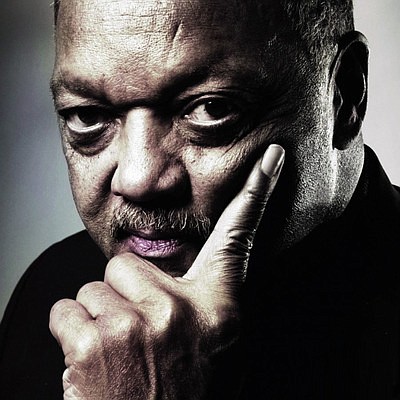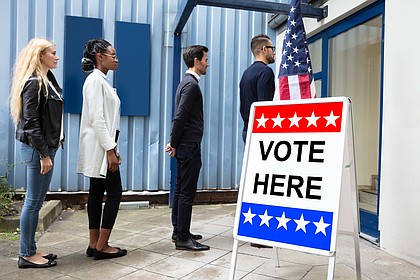Democracy not a partisan issue
Jesse Jackson | 8/19/2022, 7:22 a.m.
While the United States champions democracy across the world, our own democracy is under siege. Nothing is more fundamental to democracy than the right to vote – yet there is no explicit guarantee of the right to vote in the U.S. Constitution. The U.S. ranks near the bottom of industrial democracies in voter turnout. This isn’t accidental – many states purposefully create barriers that make it difficult to register to vote or to cast a ballot. The sensible answer to this is to create — and enforce — the right to vote for every citizen.
The 2020 presidential election witnessed the highest turnout in recent history. Eighty million people voted for Joe Biden; 74 million for Donald Trump. Yet, another 80 million who were eligible by age and citizenship did not vote. In midterm elections, like the upcoming election this year, voting turnout plummets to an average of about 40 percent of eligible voters casting ballots.
Part of this low turnout comes from neglect: campaigns focus their resources and attention on targeted segments of the population. Too often poor and working people get no attention. Part of this comes from intent – the purposeful suppression of the vote.
At the founding of the nation, U.S. leaders purposefully limited the right to vote. Initially only white, male landowners could vote. After the Civil War, the 15th Amendment outlawed discrimination on the basis of race in the right to vote, yet across the South, that right was systematically suppressed, through organized terror, poll taxes, literacy tests, or ridiculous hurdles like correctly guessing the number of beans in a jar. After much struggle, the Voting Rights Act, the centerpiece of the civil rights struggle, outlawed those tactics and Black turnout surged across the South.
In the wake of Barack Obama’s victorious presidential campaigns, however, the Republican Party became ever more intent on making voting more difficult – particularly for Blacks and Latinos and the young. And after Donald Trump’s defeat – and Republican embrace of his Big Lie that the 2020 presidential election was stolen, Republicans in various states have launched a concerted drive to restrict voting and to give Republican partisans more power over the casting and counting of votes. Over 400 bills have been introduced to make registration and voting more difficult.
In 2020, a presidential election held in the midst of the pandemic, record numbers of voters – particularly people of color – elected to vote by mail or to vote early, in order to avoid crowds and lines on Election Day. Forty-three percent of voters cast a ballot by mail; only 21 percent cast their ballot on Election Day
So Republicans – particularly in swing states where they control the state legislature – have passed measures to make voting by mail more difficult, to make it easier to disqualify such votes, to cut early voting days, to cut back on the number of polling stations particularly in urban areas. In all, The Voting Rights Alliance lists 61 different measures created to make voting more difficult, ranging from punishing voter registration groups to excessive purges of the voting rolls, to limits on student voting or on voting by those with a criminal record, to voter intimidation at the polls and more.
These measures – pushed particularly in the so-called swing states – are given greater power because of the structural impediments to democracy in the U.S. For example, Democrats have won the popular vote in seven of eight presidential elections since 1992, but because of the electoral college, have won the presidency only five times. Add to that the obscene role of big money and increasingly dark money in politics – unleashed by decisions of the activist right-wing judges on the Supreme Court, and the principle of one person, one vote is eviscerated.
Standing in the way of rectifying voter suppression is another structural impediment to democracy – the Senate created “filibuster rule” which requires a supermajority of 60 of 100 senators to overcome a filibuster to get anything done. In just the last two years, Republican senators have repeatedly used the filibuster to block electoral reform, torpedoing the For the People Act, the Freedom to Vote Act, and the John R. Lewis Voting Rights Advancement Act. These would have limited big money in politics, made voting registration easier, policed voter suppression in the states, and revived the Voting Rights Act to impede suppression measures targeted on minorities. A minority of senators representing a largely white minority of voters are blocking reforms that would empower the American people to vote and make their voices heard.
Democracy should not be a partisan issue. Voting should be grounded on the right of citizenship, not the interests of politicians. Eligible voters should be registered automatically. Election Day should not only be a national holiday, but early voting days should be extended, not constricted, voting sites should be convenient, not distant, election management should be nonpartisan, not subverted. One thing is clear. Our democracy won’t survive for long unless the people demand it – and vote to remove those who are subverting it.
You can write to the Rev. Jesse Jackson in care of this newspaper or by email at jjackson@rainbowpush.org. Follow him on Twitter @RevJJackson.
©2022 Tribune Content Agency, LLC.





